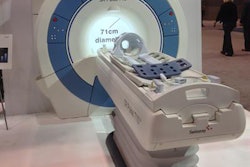Dear MRI Insider,
A new high-resolution, interactive anatomic atlas may make it easier for researchers to explore the depths of the human brain with functional MRI (fMRI) as well as more conventional MR imaging techniques.
The Gibby-Cvetko atlas is designed to segment the brain into finite anatomic regions with a resolution of 1 mm3 or less to correct for variations in brain size and better delineate the location of cortical structures and skull morphology.
The developers of the atlas believe that it will help alleviate limitations of fMRI in this application, and that it is a "big step" toward routine utilization of fMRI in clinical practice. Best of all, the atlas is readily available to any researcher at no charge. Our Insider Exclusive gives you the first look at how the Gibby-Cvetko atlas came to be.
In other news, see how two European researchers are bringing to the U.S. their proposal to collect clinical experiences and outcomes with gadolinium-based contrast agents and store the information in a worldwide database. The Gadolinium Retention Evaluation Consortium plans to make its information available through an easily accessible database where registered researchers can upload anonymized data regarding contrast agent exposure.
Pediatric patients younger than 6 years old are the most vulnerable when it comes to MRI safety issues, according to a study performed at Massachusetts General Hospital in Boston. The findings have prompted a call for quality improvements when it comes to scanning kids.
Meanwhile, the desire to avoid exposing pediatric patients to CT's ionizing radiation appears to be powering the increased use of MRI at one New York City hospital's emergency department. The shift to the modality is also prompting the facility to adjust resources to meet times of greatest volume and demand.
In California, researchers have developed a way to use diffusion-weighted MR imaging (DWI-MRI) to noninvasively monitor gene expression in tumor cells in living tissue. So far the method has been used in mice, but if it's successfully adapted to humans, DWI could help with treatment and monitoring of cancer and other diseases.
Make a visit to the MRI Community part of your daily routine for the latest news and groundbreaking research from around the world.



.fFmgij6Hin.png?auto=compress%2Cformat&fit=crop&h=100&q=70&w=100)




.fFmgij6Hin.png?auto=compress%2Cformat&fit=crop&h=167&q=70&w=250)











